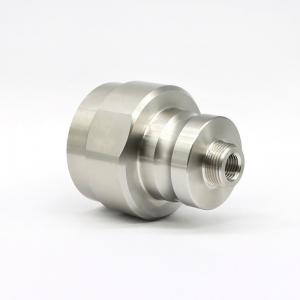

Add to Cart
CNC machining finds its best application in one-off manufacturing projects and in the
low-to-medium volume production range, spanning from several hundred to 1000 parts.
It stands out as the most economically viable option for the production of metal prototypes,
making it a preferable choice. Furthermore, CNC machining is the ideal selection when the
parts in question require exceptionally tight tolerances.
Product Details
Stainless steel is highly resistant to corrosion and rust, making it suitable for situations
where a part may be exposed to the elements for a long period of time.
Stainless steel is also fairly malleable and ductile.
| Common Stainless Steel Materials | |
| No. | Properties |
| Stainless steel 304/304L | The most common alloy and is known for its pristine surface finish. It has significantly higher corrosion and oxidation resistance. Typically used in the manufacture of sensor parts, shafts, machinery parts, medical parts, and more. |
| Stainless steel 316/316L | It is slightly higher levels of chromium and nickel that exhibits improved heat tolerance, resistance to creep and pitting, and excellent tensile strength. Typically used in the manufacture of sensor, chemical & pharmaceutical equipment parts, and more. |
| Stainless steel 303 | It is a non-magnetic, austenitic stainless steel with good resistance to mildly corrosive atmospheres, but significantly less than 304. Typically used in the manufacture of screw, gears, fittings, bushings, shaft, and more. |
| Stainless steel 420 | It is a martensitic stainless steel with good corrosion resistance as well as strength and hardness. It is capable of being heat treated to a hardness of HRC 51 minimum. Typically used in the manufacture of pivots, cams, pump shafts, surgical instrument parts, valve components, and more. |
| Stainless steel 440C | It is a martensitic stainless steel, and is the highest carbon content from 400 stainless steel series. It is usually heat treated to reach hardness of 58 - 60 HRC. Typically used in the manufacture of valve seats, piston, shaft, and more. |
| Stainless steel 430 | It is a non-hardenable ferritic stainless steel with excellent finish quality. It has good corrosion resistance with good formability and ductility. Typically used in the manufacture of fittings, flanges fasteners, piston, and more. |
| Stainless steel 430FR | It is a free-machining solenoid quality alloy, ideal for parts that require corrosion resistance and high electrical resistivity. It has excellent corrosion resistance in fresh water, gaseous, moderately acidic, and low chlorine environments. |
| Stainless steel 630 | It is commonly referred to as 17-4 and is a precipitation-hardening martensitic stainless steel that offers superior corrosion resistance. It is magnetic, readily welded. Typically used in the manufacture of sensor housing, valve, pump shaft, and more. |
Stainless Steel Finishing and Post-Processing
We specialize in the production of custom-made products and offer surface treatment services
tailored to meet our customers' specific requirements and industry standards.
Our comprehensive solutions are both efficient and cost-effective, making us a one-stop
destination with the capacity and capability to provide integrated services.
| Name | Can be Applied with |
| Electropolishing | — |
| Electroless nickel plating | Media Blasting, Tumbling |
| Media Blasting | All post processes except Electropolish and Powdercoat |
| Nickel Plating | Media Blasting, Tumbling |
| Passivation | Black Oxide, Electroless Nickel Plating, Zinc Plating, Tumbling, Media Blasting |
| Tumbling | All post processes except Electropolish and Powdercoat |
| Zinc Plating | Media Blasting, Tumbling, Passivation |
| Powder coating | — |
| Black oxide | Media Blasting, Tumbling, Passivation |
Applications of Stainless Steel Parts
Turning, a precision manufacturing technique, is adept at producing rotational, axi-symmetric
parts featuring intricate details such as holes, grooves, threads, tapers, and contoured surfaces.
Its proficiency shines in crafting limited-quantity items, particularly custom-designed shafts and
fasteners utilized in prototypes.
Furthermore, turning serves as a valuable complementary process, enabling the addition or
refinement of features to parts manufactured through alternative methods. Notable examples of
products shaped through turning include camshafts, crankshafts, baseball bats, bowls, cue sticks,
signboards, musical instruments, and the legs of tables and chairs.
Company Profile
FAQ's
1. Why choose CNC machining?
The decision to leverage CNC machining is driven by its attributes of speed, accuracy, and versatility.
This manufacturing solution excels in delivering end-use parts across different volumes with notable
efficiency, eliminating the need for substantial investments in hard tooling or intricate set-ups.
2. How long does delivery time and quotation take?
The delivery time for parts is intricately tied to their complexity. Low-complexity parts usually have a
lead time of 2-3 days, while moderate complexity extends to 2-5 days. High-complexity parts may
necessitate a lead time ranging between 5 and 15 days.
Quoting time is also linked to design complexity, ranging from 1 business day or faster for simpler
designs to 3+ business days for more intricate ones. If you have a design that requires assessment
and quoting, do not hesitate to contact our team.
3. What tolerances can achieve?
Determining tolerances involves various factors, and there isn't a universal set that applies to all
processes and materials. The final tolerances on your part depend on factors such as part size,
design geometry, the number and size of features, material properties, surface finish, and the
chosen manufacturing process.
Upon order confirmation, we conduct a Design for Manufacturing review, highlighting areas that
may need modification for improved manufacturability. It is beneficial if you can specify critical
tolerance areas in your design, allowing for potential modifications to reduce production time and
costs.
We provide general tolerance guidelines for CNC machining in metal and plastic, plastic injection
molding, CNC metals and plastic injection molding materials, metal 3D printing (+/- 0.5mm),
and the expected shrinkage rate of +/- 0.15% for vacuum casting.
All manufacturing and technical specifications must be clearly outlined in the 2D drawings for
accurate adherence.
